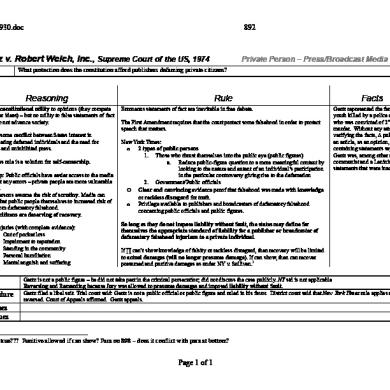Tortsii Defamation Nytimeco V Sullivan
This document was uploaded by user and they confirmed that they have the permission to share it. If you are author or own the copyright of this book, please report to us by using this DMCA report form. Report DMCA
Overview
Download & View Tortsii Defamation Nytimeco V Sullivan as PDF for free.
More details
- Words: 434
- Pages: 1
18867929.doc
867
NY Time Co. (∆) v. Sullivan (∏), Supreme Court of the US, 1964 Can a public official be defamed wrt to his handling of his duties? Issue Reasoning
Rule
Facts
Debate on public issues should be uninhibited potentially leading to sharp attacks on gov and public officials – but you let the electorate decide about public officials.
Any one claiming to be defamed by a communication must show actual malice or reckless disregard for whether it was false or not with convincing clarity or go remediless. This privilege extends to matters of public concern, public men, and candidates for office.
Human Rights advocates published a full page ad in the NY times in which they described a “wave of terror” against students and Dr. MLK. The ad contained false or at least exaggerated statements about Police actions especially wrt to MLK whom it said was arrested 7 times and was jailed for perjury.
The civil rights topic and grievances are protected by the constitution and falsity or truth of statements is not a factor of the protection. A rule requiring ∆’s to prove truth of statements against public officials will lead to self-censorship. The greater good of society of criticism far outweighs any private inconveniences.
An impersonal attack on governmental operations is not libelous to an official responsible for those operations.
Although Sullivan was not explicitly named either by name or title, he said the ad libeled him since he supervised the police dept at the time and therefore the ad attributed misconduct to him indirectly.
Actual malice: NY Times negligent in not checking facts against its archives; but no malice. 2) No explicit or implicit reference to ∏
Held Procedure P argues D argues
1 2
Reversed. Sullivan bought a libel action against NY Times and the petitioners. Court allowed the action because the 6th para could be read to be referring to him and is therefore libel per se1. Jury award for ∏. Al Supreme court said that statements were not privileged by fair comment2 (In AL, fair comment limited to opinion) (∆ appeals to Supreme court of Al which affirmed. ∆ appeals to US supreme court. ∏ says “I did not participate in the events” 2) “Ad talks about me” ∆ said they thought the ad was substantially true. The ad does not reasonably the be taken to refer to Sullivan We asked for explanations before we re-tract but Sullivan did not respond.
Not required to show damages to recover Fair comment: Common law privilege of criticism of public officers and their official conduct. (some limit to opinions only)
867
NY Time Co. (∆) v. Sullivan (∏), Supreme Court of the US, 1964 Can a public official be defamed wrt to his handling of his duties? Issue Reasoning
Rule
Facts
Debate on public issues should be uninhibited potentially leading to sharp attacks on gov and public officials – but you let the electorate decide about public officials.
Any one claiming to be defamed by a communication must show actual malice or reckless disregard for whether it was false or not with convincing clarity or go remediless. This privilege extends to matters of public concern, public men, and candidates for office.
Human Rights advocates published a full page ad in the NY times in which they described a “wave of terror” against students and Dr. MLK. The ad contained false or at least exaggerated statements about Police actions especially wrt to MLK whom it said was arrested 7 times and was jailed for perjury.
The civil rights topic and grievances are protected by the constitution and falsity or truth of statements is not a factor of the protection. A rule requiring ∆’s to prove truth of statements against public officials will lead to self-censorship. The greater good of society of criticism far outweighs any private inconveniences.
An impersonal attack on governmental operations is not libelous to an official responsible for those operations.
Although Sullivan was not explicitly named either by name or title, he said the ad libeled him since he supervised the police dept at the time and therefore the ad attributed misconduct to him indirectly.
Actual malice: NY Times negligent in not checking facts against its archives; but no malice. 2) No explicit or implicit reference to ∏
Held Procedure P argues D argues
1 2
Reversed. Sullivan bought a libel action against NY Times and the petitioners. Court allowed the action because the 6th para could be read to be referring to him and is therefore libel per se1. Jury award for ∏. Al Supreme court said that statements were not privileged by fair comment2 (In AL, fair comment limited to opinion) (∆ appeals to Supreme court of Al which affirmed. ∆ appeals to US supreme court. ∏ says “I did not participate in the events” 2) “Ad talks about me” ∆ said they thought the ad was substantially true. The ad does not reasonably the be taken to refer to Sullivan We asked for explanations before we re-tract but Sullivan did not respond.
Not required to show damages to recover Fair comment: Common law privilege of criticism of public officers and their official conduct. (some limit to opinions only)
Related Documents

Tortsii Defamation Nytimeco V Sullivan
May 2020 2
Tortsii Defamation Gertz V Robert Welch Inc
May 2020 1
Sullivan V Sapp
August 2019 6
Sullivan
May 2020 19
Sullivan V. Little Huntington Park
June 2020 15